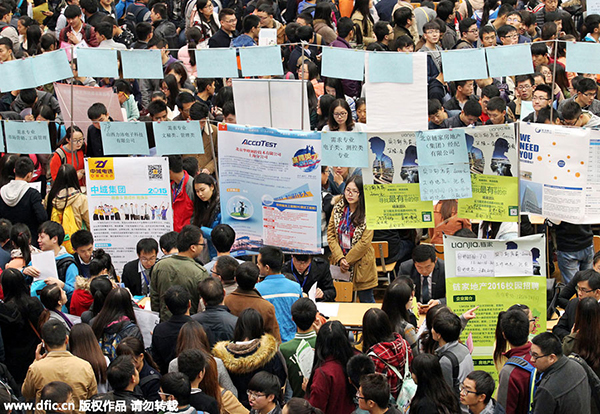Greater say for universities in own affairs can help graduates suit the job market
(China Daily) Updated: 2016-03-16 07:57
 |
|
A job fair held at Xi'an University of Science and Technology attracted thousands of college graduates, Nov 7, 2015. [Photo/IC] |
Zheng Qiang, president of Guizhou University in Southwest China's Guizhou province and a deputy to the National People's Congress, has called for more and better universities to be built up in China to develop more talent. However, the poor employment records of some existing universities should be addressed first, said Beijing Youth Daily on Tuesday:
For some educational authorities, the difficulties some university graduates face in getting a job is hardly a pressing problem, because in comparison with China's total population, university students are a minority.
Less than 1-in-10 of the mainland's population have a college degree or above, while, in comparison, about 4-in-10 have at least a bachelor's degree in the United States. That partly justifies China's educational authorities' determination to expand the enrollment of college students.
But the quality of talent recruitment, as well as the two countries' social and economic differences, also need to be taken into account. In general, most US colleges have their particular academic focuses, and students in the US have to put extra efforts into their studies to get a diploma, including those in community and vocational colleges.
This is rarely the case in Chinese universities, where students can easily manage to graduate once they are enrolled, even though their capabilities do not meet the needs of most employers.
Being the world's second-largest economy, China's revenue from value added services accounts for only 47 percent of its total GDP, which lags far behind that of the US. The gap may continue to expand if China fails to recruit more creative talents for the service industry, which accommodates most Chinese college graduates.
Of course, graduates are supposed to choose their careers based on their qualifications and employment opportunities, but it is inappropriate to rush them to take a job that has little to do with the subjects they have studied. The higher education they receive should be able to improve their competitiveness and capabilities, and help prepare them for a good career.
Therefore, to improve the quality of talent, Chinese universities should be given a better say in managing their affairs; they also need to adopt more modern governance and get rid of the administrative restrictions.
- Peking University is good, but not 100% perfect
- Top-tier cities still first choice for leading university grads
- University students demand protection
- 'High-level university construction' a hot phrase at Fujian two sessions
- China, Singapore to establish a university in Chongqing
- Wuxi adds two municipal entrepreneurship bases for university start-ups
- Jiangnan University wins national patent gold award

I’ve lived in China for quite a considerable time including my graduate school years, travelled and worked in a few cities and still choose my destination taking into consideration the density of smog or PM2.5 particulate matter in the region.










